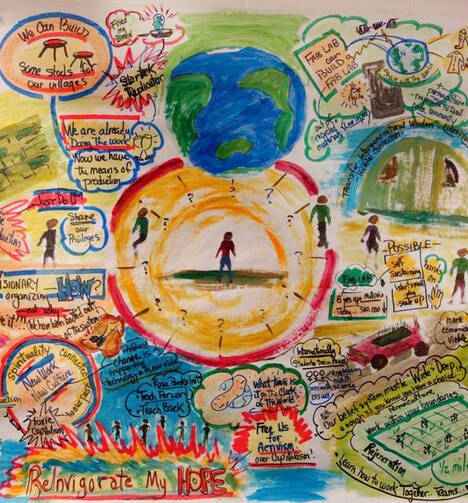I went to Detroit last week looking for the concrete, for the tangible stuff I’d heard was there—guerrilla farms carved into abandoned lots, foreclosed homes turned into communes and other such peeks into the apocalyptic future that maybe other cities have coming their way when the American dream abandons them, too. Those were there all right. Pedaling around the Motor City’s quiet boulevards at the speed of a bike, the possibilities are as ever-present as the wreckage, and in many cases the two are one and the same.
Half of my stay I devoted to a conference called New Work New Culture, an oblique celebration of philosopher Frithjof Bergmann’s decades-long quest, amid the crumbling of the auto industry, to devise ways of transforming work from a chore into a joy. (That weekend in town there was also the Black Farmers and Urban Gardeners Conference and the visit of United Nations representatives to investigate the water shutoffs that are part of the city’s ongoing and catastrophic bankrupcy proceedings.) “Ask what New Work is,” said a environmental-justice organizer living at the New Work Field Street Collective house where I slept on the floor, “and everyone will tell you something different.” That’s kind of the point. Bergmann holds that the genesis of good work lies in each individual probing her or his truest desire.
Nevertheless, I wanted some clarity. How about a model to take home to Brooklyn, straight from the persistent survivors of Detroit—a business tip or hustling trick? If something works in Detroit, surely it can work anywhere. To that frame of mind alone, however, the first day of the conference amounted to an almost total waste of time.
Under the florescent lights of an enormous lecture hall at Wayne State University, the invocation came as a masterful volley of African drumming, in which we were expected to participate with rhythmic clapping. The discussions that followed were entirely on the “New Culture” side of things, consisting largely in what seemed like fairly general reflections on Life derived from a synthesis of activist idioms, Africana and plain experience.
The overall gist was the reclamation of our own humanity, and our recognition of each other’s. Perhaps the most often-heard phrase was a question: “What time is it on the clock of the world?” These, everyone knew, were the Hegelian words of Grace Lee Boggs, the mentor of many of the organizers, but by this point 99 years old and confined to her home. People invoked it less a question to be answered outright than one to provoke further journeys inward, or to figure out “a way out of no way.” Surely not anything concrete.
“If you stand here”—meaning Detroit—“and survive, you learn something about a higher self,” said Mama Sandra Simmons, a transfixing woman who introduced herself, among other things, as an ordained minister. By her lights, New Work “comes down to forgiveness.”
As the day’s panels ended, a variety of percussion instruments were handed out to the crowd, and thus began a free-jazz caucophony that took several minutes to resolve into a common beat. I received, and proceeded to shake, an old plastic POM juice bottle with sand in it.
The second day was more like what I’d originally had in mind. Attendees grilled Bergmann on the features of his theory. I interviewedseveral prominent Marxistintellectuals, and attended nitty-gritty discussions about financing cooperative enterprises and organizing time banks. I joined a tour of a sophisticated fab-lab—a digital fabrication facility—in which “at-risk” youth were making everything from coasters to an electric car and a whole house with precision mills and 3-D printers. Something to write home about, for sure.
That night I went for a drink with some of Boggs’ acolytes. To get back to my inflatable mattress, I caught a ride to the commune with Tawana Petty, the driving force of the conference, an activist and mother with a relentless smile that she says she learned while serving fast food. I listened from the back seat as she, in the passenger seat, caught up with a visiting friend behind the wheel. She described a moment in which she’d been unexpectedly called to speak before the U.N. representatives about the water crisis. She said she’d felt the ancestors speaking through her, in her, with her. Not blood family, necessarily—for instance, Charity Hicks, a woman who’d fought with particular tenacity against the water shutoffs until being killed by a rouge car. “Charity was there,” Petty said.
The noble counter-cultural experiments of Detroit, as best as I can judge, are for the most part in the process of being steamrollered by capital, or co-opted when doing so is profitable. The tide, to use a familiar metaphor for an all-too-familiar situation, will raise some boats and drown others. The only way for those others seems to be no-way. What an error on my part to take so long to notice that the primary tip or trick these holdouts of Detroit had to offer was the stubborn cultivation of faith.









Thank you for your kind words. Your organization sounds fascinating. If you're able, please send me more information about it.